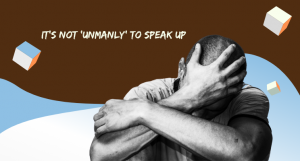17 Jun Men’s Mental Health

By Ishma Alvi
Though gender neutrality can be helpful, it might be disingenuous to remove gender entirely from the discussion around mental health. Like other factors that make up our identity, gender has an impact on how we think, feel and act. What would be unhelpful in any discussion about mental health is to make gender the sole variable in influencing identity and mental health or stick to unhelpful stereotypes regarding any one gender.
With that in mind, there are ways in which gender and culture can intersect to inform mental health. Masculine stereotypes that exist in certain parts of Australian culture can impact how men engage with their own mental health. Some of the ways these stereotypes can impact thinking include:
“I can do it myself” which can translate into avoiding direct requests for help. This can then lead to feelings of isolation.
“I’m alright” can involve not clearly identifying and as a result, not expressing more vulnerability-causing emotions (such as fear) and the needs around them. This can lead to feelings of confusion and overwhelm.
“I don’t want to talk right now” which can include electing to withdraw when feeling stressed or overwhelmed. This can heighten already present isolation, overwhelm and even impact self-worth.
These tropes, if too strongly or closely held, can then impact mood. Men statistically have lower rates of depression than other genders; one in seven men, one in five women and one in six trans and gender diverse people according to Beyond Blue and LGBTIQ+ Health Australia 2021. This does not necessarily mean that men have lower rates of depression and but may mean that men report it less. This hypothesis of underreporting can be supported by the evidence that suggests that men struggle with the highest rates of substance abuse relative to women, according to Australian Men’s Health. Men may be struggling but not reporting the issues and acting out in ways that help them avoid it or numb their distress to it.
The question is what can be done to help?
As a man, start with what feels possible to you and go from there. Start by talking to a friend, partner or family member if you are struggling. By doing that you will take the first steps to see that asking for help is not as uncomfortable as it may feel. This also breaks the emotional silo and allows you to see that others struggle too and that it’s ok to struggle sometimes.
Start, if only to yourself, naming your feelings beyond the basic ‘good’ and ‘bad’. This allows you to identify your feelings and use that as a lead to identify when you feel good or bad, what increases or decreases those feelings and whether or not those are helpful or sustainable. That way you can start making choices that manage your mental health in ways that actually create positive change.
Check and challenge. Notice the way you talk to yourself, how you talk to yourself and the words you use – tap into that inner monologue we all have. Then ask yourself a few questions about that monologue. Is the way you talk to yourself the way you’d talk to someone else who was in the same position? Is the way you talk to yourself helpful? Is it even valid? If it is none of these things, identify what would be a more helpful way to talk to yourself or more helpful and valid things to say or ways to say them.
Watch the basics. Often when we feel sad, flat, low or agitated, the basics i.e., sleep, diet, exercise and socializing are ignored. However, it is precisely at those times when we need the basics the most. So, keep an eye on those, ensuring that you maintain a moderate level of self-care in this regard.
And finally, be the change. If you notice someone around you struggling and the signs remind you of a time when you were in the same position, reach out to them. Normalizing the fact that we all struggle helps break down the barriers of isolation and low self-esteem.
This Blog was written by Ishma Alvi. To learn more about Ishma’s experience, click here.
To book an appointment to see her, or one of the other Psychologists at Vida click here.


Sorry, the comment form is closed at this time.